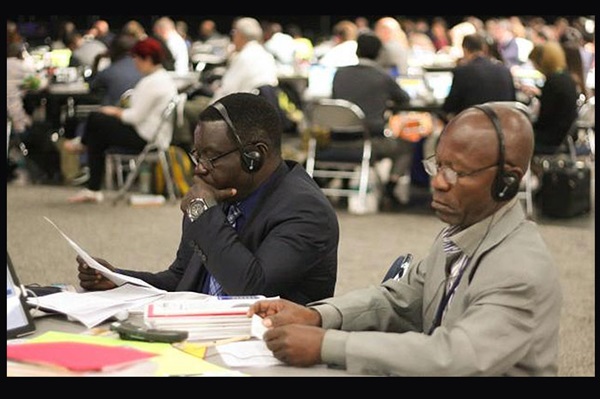In finding a way forward for The United Methodist Church, bishops have their work cut out for them.
That's apparent from talking to delegates to the special General Conference, the lawmaking assembly that will have the final say on whatever the bishops propose when it meets Feb. 23-26, 2019, in St. Louis, Missouri.
Your support of The General Administration Fund apportionment implements trustworthy administrative oversight like the General Conference sessions.
With the special General Conference less than a year away, United Methodist News Service asked delegates of varied views to offer their preliminary thoughts on the current possibilities.
United Methodist News Service reached out via email or phone to 14 General Conference delegates in the U.S., Africa, Europe and the Philippines with a goal of representing the denomination's geographic and theological diversity on whether the bishops should submit one or more plans. Six delegates — five from the U.S. and one from Liberia — responded.
This story does not reflect a representative survey of the 864 delegates who will be at 2019 special General Conference, but it is intended to give some early impressions on the task ahead.
Bishops preside at General Conference but do not serve as delegates.
"If this were easy, we would have worked it out 30 years ago," said Dr. Steve Furr, a lay delegate from the Alabama-West Florida Conference.
Furr said he personally is intrigued by the multi-branch model but needs more details. He suggested the church might be better served by having just two branches — one progressive and one traditionalist.
The Rev. David Livingston, a delegate from the Great Plains Conference, is open to the multi-branch option. He sees the one-church model as a compromise — short of full inclusion — but one he can support.
Like Livingston, Randall Miller — a California-Nevada lay delegate to the 2016 General Conference — also sees the "one-church model" as a compromise. He leans in the direction of that plan, but added that members of the unofficial advocacy group Reconciling Ministries Network are not all of one mind.
The Rev. George Weagba, a delegate from the Liberia Conference and vice president at that country's United Methodist University, said he doesn't think anything short of the traditional plan will pass muster with his fellow African delegates.
The Rev. Keith Boyette, a reserve delegate from the Virginia Conference, is the president of the Wesleyan Covenant Association. The group also announced that it would not support any plan that leaves questions of ordination and marriage up to congregations or conferences.
The Rev. Mike Slaughter, a delegate from the West Ohio Conference and pastor emeritus of Ginghamsburg Church, holds out hope most of the church can stay together. He supports the one-church model.
But he knows that for some, the model will not work, and he expects the one-church model to offer a way to exit with property.
Whatever happens in 2019, he and other delegates predict the church will see change.
"We're at the point where we can't keep passing this down," Slaughter said.
Heather Hahn, multimedia news reporter for UMNS
One of seven apportioned giving opportunities of The United Methodist Church, the General Administration Fund implements trustworthy administrative oversight, supports the legislative processes of the church and curates The United Methodist Church's rich history. Please encourage your leaders and congregations to support the General Administration Fund apportionment at 100 percent.





